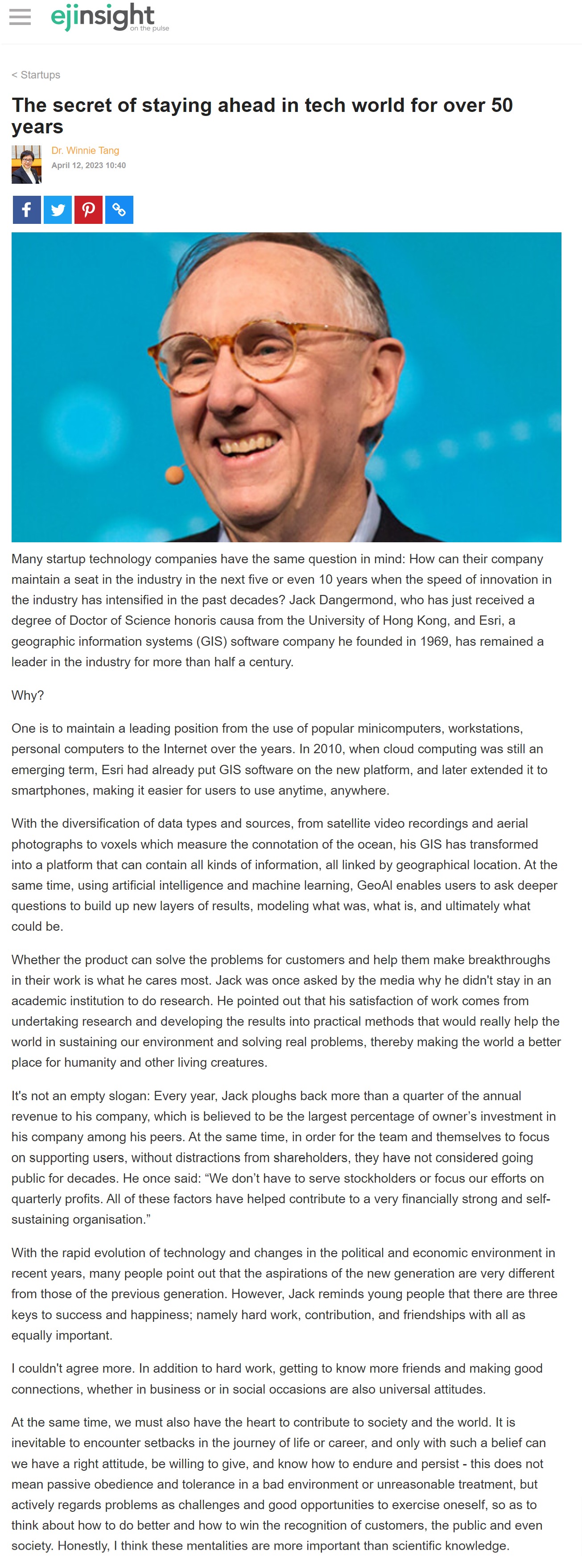網上版請按此

The secret of staying ahead in tech world for over 50 years
Many startup technology companies have the same question in mind: How can their company maintain a seat in the industry in the next five or even 10 years when the speed of innovation in the industry has intensified in the past decades? Jack Dangermond, who has just received a degree of Doctor of Science honoris causa from the University of Hong Kong, and Esri, a geographic information systems (GIS) software company he founded in 1969, has remained a leader in the industry for more than half a century.
Why?
One is to maintain a leading position from the use of popular minicomputers, workstations, personal computers to the Internet over the years. In 2010, when cloud computing was still an emerging term, Esri had already put GIS software on the new platform, and later extended it to smartphones, making it easier for users to use anytime, anywhere.
With the diversification of data types and sources, from satellite video recordings and aerial photographs to voxels which measure the connotation of the ocean, his GIS has transformed into a platform that can contain all kinds of information, all linked by geographical location. At the same time, using artificial intelligence and machine learning, GeoAl enables users to ask deeper questions to build up new layers of results, modeling what was, what is, and ultimately what could be.
Whether the product can solve the problems for customers and help them make breakthroughs in their work is what he cares most. Jack was once asked by the media why he didn't stay in an academic institution to do research. He pointed out that his satisfaction of work comes from undertaking research and developing the results into practical methods that would really help the world in sustaining our environment and solving real problems, thereby making the world a better place for humanity and other living creatures.
It's not an empty slogan: Every year, Jack ploughs back more than a quarter of the annual revenue to his company, which is believed to be the largest percentage of owner's investment in his company among his peers. At the same time, in order for the team and themselves to focus on supporting users, without distractions from shareholders, they have not considered going public for decades. He once said: "We don't have to serve stockholders or focus our efforts on quarterly profits. All of these factors have helped contribute to a very financially strong and self-sustaining organisation."
With the rapid evolution of technology and changes in the political and economic environment in recent years, many people point out that the aspirations of the new generation are very different from those of the previous generation. However, Jack reminds young people that there are three keys to success and happiness; namely hard work, contribution, and friendships with all as equally important.
I couldn't agree more. In addition to hard work, getting to know more friends and making good connections, whether in business or in social occasions are also universal attitudes.
At the same time, we must also have the heart to contribute to society and the world. It is inevitable to encounter setbacks in the journey of life or career, and only with such a belief can we have a right attitude, be willing to give, and know how to endure and persist - this does not mean passive obedience and tolerance in a bad environment or unreasonable treatment, but actively regards problems as challenges and good opportunities to exercise oneself, so as to think about how to do better and how to win the recognition of customers, the public and even society. Honestly, I think these mentalities are more important than scientific knowledge.
Dr. Winnie Tang
Adjunct Professor, Department of Computer Science, Faculty of Engineering; Department of Geography, Faculty of Social Sciences; and Faculty of Architecture, The University of Hong Kong